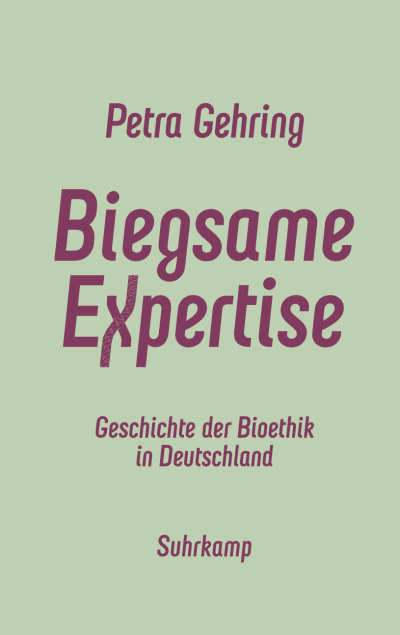Malleable Expertise / Biegsame Expertise
The History of Bioethics in Germany
With numerous illustrations
The new definitve work on bioethics in Germany
When, how, and why did bioethics appear in Germany? How was it able to establish itself so successfully in the turbulent field between science, politics, and the public sphere? In Malleable Expertise, Petra Gehring tells the compelling story of the rapid evolution of a discourse in a politically charged arena. A story that was shaped as much by parliaments, the media, and protest movements as it was by medicine, law, theology, philosophy, and the buzzword...
Read more
When, how, and why did bioethics appear in Germany? How was it able to establish itself so successfully in the turbulent field between science, politics, and the public sphere? In Malleable Expertise, Petra Gehring tells the compelling story of the rapid evolution of a discourse in a politically charged arena. A story that was shaped as much by parliaments, the media, and protest movements as it was by medicine, law, theology, philosophy, and the buzzword "interdisciplinarity".
Drawing on numerous interviews with people who were involved in the emergence of the field and extensive background research, Gehring sketches out the debates surrounding organ donorship and the definition of brain death, "test-tube babies" and the preimplantation screening of embryos, as well as the battles over what ethical expertise actually is. She explains how the notion of an instrumentalised ethics that can be simply “applied” has solidified into a powerful ideal.
Gerhing also critically interrogates the societal role of an ethics that has come to be not just a science, but also a performative format with a great deal of influence. As such, Malleable Expertise also articulates a theory of the power of applied ethics. More than anything, though, it delivers a captivating chapter in the history of public morality.
Drawing on numerous interviews with people who were involved in the emergence of the field and extensive background research, Gehring sketches out the debates surrounding organ donorship and the definition of brain death, "test-tube babies" and the preimplantation screening of embryos, as well as the battles over what ethical expertise actually is. She explains how the notion of an instrumentalised ethics that can be simply “applied” has solidified into a powerful ideal.
Gerhing also critically interrogates the societal role of an ethics that has come to be not just a science, but also a performative format with a great deal of influence. As such, Malleable Expertise also articulates a theory of the power of applied ethics. More than anything, though, it delivers a captivating chapter in the history of public morality.
2024, 1343 pages
Persons
Petra Gehring
Author
Petra Gehring was born in 1961 and is a professor of philosophy at the Technical University of Darmstadt. She works on a wide range of topics, from the history of metaphysics to research on technology and the methodologies of the digital humanities. She was a fellow at the Wissenschaftskolleg zu Berlin and is currently Chairwoman of the German Council for Scientific Information Infrastructures and director of the Centre Responsible Digitality (ZEVEDI).
Petra Gehring
Author
Petra Gehring was born in 1961 and is a professor of philosophy at the Technical University of Darmstadt. She works on a wide range of topics, from...
© Jürgen Bauer


